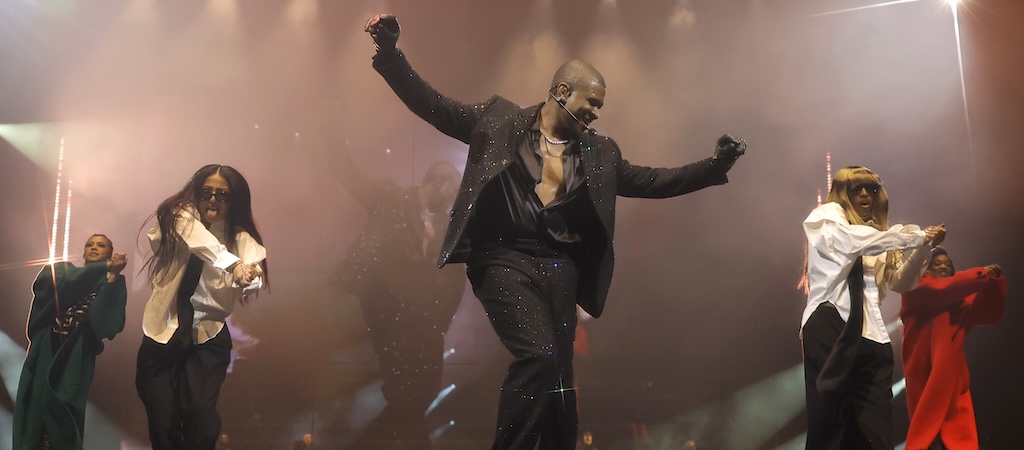
The word “legend” gets thrown around too loosely these days — as do the epithets “G.O.A.T.” (“greatest of all time”), “icon,” and “generational talent.” All too often, they get applied to artists or athletes in the midst of a great, maybe even mind-blowing run. But they are also applied too quickly, before the true test of iconic status can really be weathered or overcome: Time. Runs end; even some of the most paradigm-shifting talents can come and go in the matter of months or just years. Perhaps they set the foundation for true greatness to stand on after them, and that should be noted, but they probably shouldn’t be remembered as pillars or exemplars of their craft.
Wednesday night at the Intuit Dome in Inglewood, California, Usher Raymond earned — or rather, proved that he long ago already earned — all-time status with the Los Angeles stop of his aptly-titled Past Present Future Tour.
Here’s a thought exercise: Think of Usher’s contemporaries in R&B or pop music — the Justin Timberlakes, the Tevin Campbells, the myriad of quartets, trios, and boy bands to have come and gone since Usher’s debut in 1994 with his self-titled album. Stars have fallen; controversies, both fabricated and substantiated, have stalled ascensions; many have reached dizzying heights but become untethered from the craftsmanship that made them. Even beyond just smooth vocalists, Usher stands more or less alone.
Sure, Snoop Dogg has become a titan of pop culture, but his last RIAA-certified album was 2008’s Ego Trippin’. He’s better known for sports commentary than music at this point. Jay-Z? Hasn’t made a new album since 2017’s 4:44 (critically hailed though it was). And a handful of Usher’s contemporaries are so much worse off at this point — especially this year — that it’s better not to mention them at all.
But Usher, who garnered his first Hot 100 No. 1 in 1997 with “Nice & Slow,” and whose string of Hot 100 hits continues to this day with his independent album Coming Home and its lead single “Good Good,” has nearly outlasted them all. He’s retained his radio relevance while becoming the sort of towering titan of pop culture capable of headlining the Super Bowl Halftime Show, which he did this year to tremendous acclaim, reminding doubters that he’s got almost 30 years worth of hits to draw from. He did just that at BET Awards in June as he was honored with a Lifetime Achievement Award.
And he does it again on the Remy Martin-backed Past Present Future Tour, with a setlist reaching all the way back to his fresh-faced debut and running through R&B touchstones like “Burn,” “Lovers And Friends,” “My Way,” “Superstar,” “U Remind Me,” and “You Make Me Wanna…”; club classics like ““DJ Got Us Fallin’ In Love” and “Yeah!”; and the sports stadium staple “OMG.”
Wednesday night, Usher also showcased the depth of his Rolodex, employing comedic chops alongside a bare-chested Kevin Hart, who teased the audience with his own rendition of “Nice & Slow” before being given the tongue-in-cheek boot by his host. Breakout star Tommy Richman put in an appearance to chirp his way through his smash “Million Dollar Baby” before Usher’s spiritual ancestor Stevie Wonder took to his piano at center stage, with the star of the evening doing duets to “Ribbon In The Sky” and more. Who else has that kind of pull, plus the generosity to cede the spotlight to his inspirations?
What impressed me the most is that I saw Usher do nearly the same setlist — albeit with a shuffled song order — at his Las Vegas residency not a full year ago. His stage at Intuit Dome struck me as being far less elaborate than the stage at Dolby Live at Park MGM — it certainly never transformed into a scale replica of his hometown’s Magic City, opting for a more (ahem) stripped-down approach — yet his performance was no less engaging. I didn’t think he’d have the room to pull off his roller skating tricks, and yet, he did. The crowd was inarguably larger than the capacity at his theater show, yet even the rafters were rollicking to “There Goes My Baby” and “Climax.”
The new venue undoubtedly helped; at some point during the show, I texted my editor to request that I only cover concerts at Intuit Dome for the rest of my tenure at Uproxx. Yes, there’s a little homerism from a lifelong Clippers fan, but the building’s design, intended to highlight the partisanship of a basketball home game, also lends itself toward amazing acoustics that complement its state-of-the-art, brand-new sound system, and terrific sight lines, as even sitting at a right angle to the stage, budged up against The Wall (inspired by college arenas), allowed a fantastic view of the stage and its recesses.
But, honestly, Usher doesn’t really need the help. Even without the massive, cutting-edge production on display, without the fleet of rigorously conditioned dancers, without the laser lights, and without the double-digit costume changes he effected throughout the night, Usher would be the consummate performer. He’s not just a once-in-a-generation talent, he’s a multigenerational one. He’s got a massive past catalog to draw from, but he’s also a modern hitmaker and superstar — and like his hero Stevie, he’s likely to remain one for generations to come.
